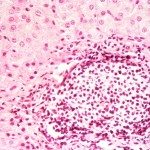Link to Pubmed [PMID] – 17020941
J. Virol. 2006 Dec;80(24):12420-4
Mechanisms of cellular transformation associated with human papillomavirus type 5 (HPV5), which is responsible for skin carcinomas in epidermodysplasia verruciformis (EV) patients, are poorly understood. Using a yeast two-hybrid screening and molecular and cellular biology experiments, we found that HPV5 oncoprotein E6 interacts with SMAD3, a key component in the transforming growth factor beta1 (TGF-beta1) signaling pathway. HPV5 E6 inhibits SMAD3 transactivation by destabilizing the SMAD3/SMAD4 complex and inducing the degradation of both proteins. Interestingly, the E6 protein of nononcogenic EV HPV9 failed to interact with SMAD3, suggesting that downregulation of the TGF-beta1 signaling pathway could be a determinant in HPV5 skin carcinogenesis.
